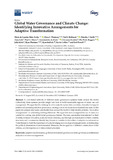| dc.contributor.author | Melo Zurita, Maria de Lourdes | |
| dc.contributor.author | Thomsen, Dana C. | |
| dc.contributor.author | Holbrook, Neil J. | |
| dc.contributor.author | Smith, Timothy F. | |
| dc.contributor.author | Lyth, Anna | |
| dc.contributor.author | Munro, Paul G. | |
| dc.contributor.author | de Bruin, Annemarieke | |
| dc.contributor.author | Seddaiu, Giovanna | |
| dc.contributor.author | Roggero, Pier Paolo | |
| dc.contributor.author | Baird, Julia | |
| dc.contributor.author | Plummer, Ryan | |
| dc.contributor.author | Bullock, Ryan | |
| dc.contributor.author | Collins, Kevin | |
| dc.contributor.author | Powell, Neil | |
| dc.date.accessioned | 2018-05-24T16:17:35Z | |
| dc.date.available | 2018-05-24T16:17:35Z | |
| dc.date.issued | 2018 | |
| dc.identifier.citation | Melo Zurita, Maria de Lourdes, Dana C. Thomsen, Neil J. Holbrook, Timothy F. Smith, Anna Lyth, Paul G. Munro, Annemarieke de Bruin, Giovanna Seddaiu, Pier Paolo Roggero, Julia Baird, Ryan Plummer, Ryan Bullock, Kevin Collins, and Neil Powell. "Global water governance and climate change: Identifying innovative arrangements for adaptive transformation. Water." 10(1) (2018): 29. DOI: 10.3390/w10010029. | en_US |
| dc.identifier.other | 2073-4441 | |
| dc.identifier.uri | http://hdl.handle.net/10680/1494 | |
| dc.description.abstract | A convoluted network of different water governance systems exists around the world.
Collectively, these systems provide insight into how to build sustainable regimes of water use and management. We argue that the challenge is not tomake the systemless convoluted, but rather to support positive and promising trends in governance, creating a vision for future environmental outcomes. In this paper, we analyse nine water case studies from around the world to help identify potential ‘innovative arrangements’ for addressing existing dilemmas. We argue that such arrangements can be used as a
catalyst for crafting new global water governance futures. The nine case studies were selected for their diversity in terms of location, scale and water dilemma, and through an examination of their contexts, structures and processes we identify key themes to consider in the milieu of adaptive transformation.
These themes include the importance of acknowledging socio-ecological entanglements, understanding
the political dimensions of environmental dilemmas, the recognition of different constructions of the
dillema, and the importance of democratized processes. | en_US |
| dc.description.sponsorship | The research for this paper is a part of the “CADWAGO: Climate change adaptation and water governance—reconciling food security, renewable energy and the provision of multiple ecosystem services” project funded as part of the “Europe and Global Challenges programme” by Compagnia di San Paolo, VolkswagenStiftung and Riksbankens Jubileumsfond. | en_US |
| dc.description.uri | https://www.mdpi.com/2073-4441/10/1/29 | |
| dc.language.iso | en | en_US |
| dc.publisher | MDPI AG, Basel, Switzerland. | en_US |
| dc.rights | info:eu-repo/semantics/openAccess | |
| dc.subject | adaptive transformation | en_US |
| dc.subject | global environmental governance | en_US |
| dc.subject | water governance | en_US |
| dc.subject | institutional analysis | en_US |
| dc.subject | innovative arrangements | en_US |
| dc.title | Global Water Governance and Climate Change: Identifying Innovative Arrangements for Adaptive Transformation | en_US |
| dc.type | Article | en_US |
| dc.identifier.doi | 10.3390/w10010029 | |

